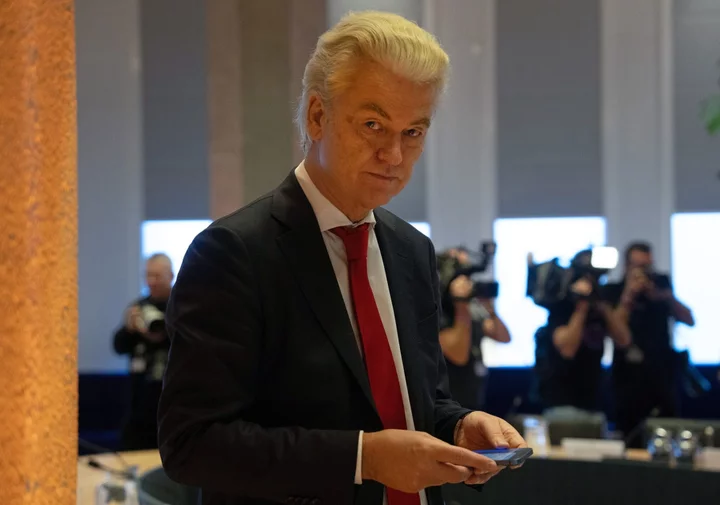The ascent of Geert Wilders’ party has thrown Dutch climate ambitions into limbo, with environmental groups warning of “devastating” effects for progress on green targets.
The shock victory of the populist Freedom Party in this week’s election echoed a surge in support for far-right groups across Europe, driven mainly by concerns over living costs and immigration. While Wilders’ pledges particularly appealed to voters seeking to limit migrant numbers, his party’s manifesto includes proposals to stop reducing carbon-dioxide emissions and put key climate agreements “through the shredder.”
On the day after the vote the mood at the Netherlands’ climate ministry was best described as funereal, a person familiar with the matter said. Many officials mourned the election result, afraid that their years of hard work will be dismantled by a potential new government, the person said.
Disheartened staff members were consoled by the first — and perhaps last — Dutch Climate Minister Rob Jetten, who made rounds through the ministry after his Democrats 66 party lost support just a few hours earlier. It’s now set to gain just nine seats, down from 24 in the previous government.
The Netherlands has only recently come in sight of its 2030 climate goal to reduce emissions 55% compared to 1990 levels. The outgoing government warned in October that “rapid and ambitious” implementation of decarbonization plans was still crucial to achieving that aim.
While Wilders has said that he wants to exit the Paris climate accord and dismantle a fund aimed at reducing harmful emissions, it’s not yet clear what direction a new government will take as it would have to work alongside coalition partners with different political priorities.
The country also has European Union-level climate commitments it needs to comply with. The bloc is preparing to devise a 2040 emission-reduction goal next year, with EU climate commissioner Wopke Hoekstra, a Dutch national, pledging to defend a target of at least a 90% net reduction versus 1990. However, a new goal that will be proposed after a new commission takes office next year will require political endorsement from EU leaders, and a potential U-turn by the Netherlands from its traditionally green stance could complicate Europe’s push.
“For investors who are convinced that the future will be net zero, it will be a negative signal. For investors that felt hampered by all the policy measures aiming at net zero, they might feel relief in the short term,” said Sandra Phlippen, Chief Economist of ABN Amro Bank NV of Wilders’ electoral success. It will be “interesting to watch” if his policies will be “paddled back,” she said.
Four Greenpeace campaigners kayaked into the pond in front of the prime minister’s office in The Hague on Thursday to protest the election result. The campaigners displayed a banner which called for “no climate denier as our prime minister.”
The election result is “devastating for climate, nature and people,” said Andy Palmen, director of Greenpeace Netherlands. “Wilders denies the climate crisis and denies science, it’s not acceptable that he might become our next prime minister.”
Greenpeace is calling on the other parties that are needed to form a government to “take responsibility” and address the climate issue, said Palmen. “Populist parties on the far-right side are on the rise in Europe, but lack solutions for the serious challenges we are facing as humanity,” he added.
The fragmented political landscape of the Netherlands means that Wilders faces a long series of negotiations if he wants to become prime minister of the country. Wilders has been courted by the Farmers’ Citizen Movement, known by its Dutch initials BBB, for a possible collaboration. The farmer party is set to have seven seats in the lower house of parliament and earlier this year became the largest party in the upper house.
As the Netherlands has sought to curb the environmental impact of agriculture, it has been battling the fury of its farmers. Last year, the government pushed to halve nitrogen emissions by 2030, which led to farmers blocking highways in protest. The plan — which was watered down earlier this year — aims at reducing livestock by a third as the sector is a key source of nitrogen emissions.
The BBB, led by politician Caroline van der Plas, made a statement by bringing seven tractors to the Hague on Friday to represent the seven seats they now have.
“Support for climate measures will be way lower in this new parliament,” said Kees Aarts, professor of political institutions and behavior at Groningen University. “The implementation of climate measures will be delayed and that is risky. This is a very bad development.”
--With assistance from Sarah Jacob, Ewa Krukowska and Gina Turner.

